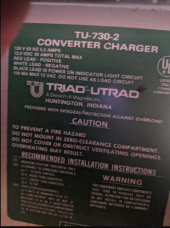Yes, those MC4 connectors should work. I have no experience with that brand. Reviews seem good, if you are inclined to believe the reviews on Amazon.
Your list of loads looked like a 1000 watt inverter would work, until you listed the microwave and air conditioner. I've been using a 1000 watt inverter for the past four years to power a coffee maker, laptop, charge phones and even a 500 watt space heater. But I had no expectation that the inverter was going to power the microwave, let alone the air conditioner. I did not connect my inverter into the RV's distribution panel. I ran a dedicated outlet from the inverter (it supports a hard wired connection like that) to the cabinet where I run the coffee pot from.
Victron Energy doesn't make a plain inverter for the U.S. market. Their inverter-only series is all 230 Vac for the European market and you need 120 Vac. Check out
Xantrex ProWatt and the
GoPower Inverter. Neither of these has a hard wired option, meaning you have to plug into the provided outlets on the inverter.
I have an older version of the Xantrex inverter, but modified sine wave, not pure sine wave. It has been a good inverter for me for what I've asked of it. But I kept my expectations low (no microwave use).



